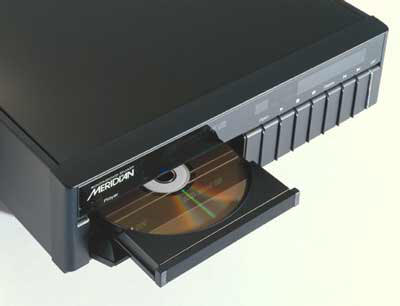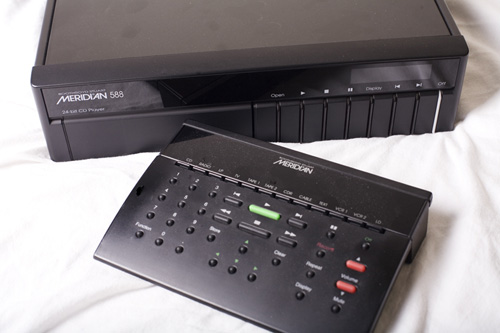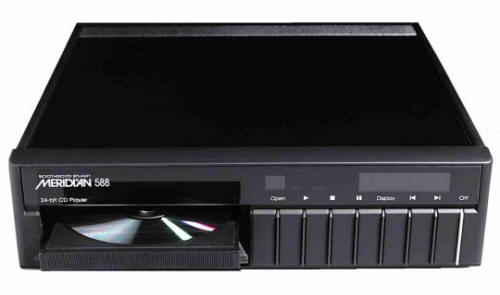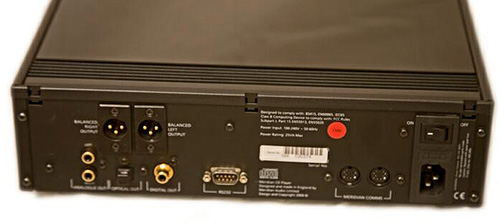You are reading the older HTML site
Positive Feedback
ISSUE
25
may/june
meridian
588-24 CD player
as reviewed by Ed Morawski

|
ED MORAWSKI'S SYSTEM:
LOUDSPEAKERS
ELECTRONICS
SOURCES
CABLES
ACCESSORIES
|
This is the second in a series of articles about late-model CD players in the $3000-4000 range. I have already discussed the Musical Fidelity A308CR, will review the Meridian 588-24 in this article, and will cover the brand-new Accuphase DP-57 in the next piece. I will then compare them, and the winner will serve as my reference. In the final article of the series, I will review a top-secret new turntable, and compare it to the digital contenders, so stay tuned!
If any company in the industry knows about digital playback, it is Meridian. Designers Bob Stuart and Allen Boothroyd practically wrote the book on digital music reproduction. They seem to have veered off into the home entertainment realm lately, but I was still curious to hear their highly regarded 588-24 player ($4000). I had only heard it at CES, in the Convention Center, and was not too impressed, but considering the environment, I couldn't expect much. Given Meridian's reputation, I felt I should give it a try. The 588 replaced the famous 508. The principal difference was the use of a DVD-ROM computer drive instead of the conventional, audio-type transport mechanism in the 508. According to Meridian, the DVD-ROM drive has much better error correction and lower jitter.
I was lucky enough to find an excellent 588-24, and it was soon on its way to me. When the package arrived, I opened it anxiously, only to be completely underwhelmed. I couldn't believe how small and plain the player was. Only 13 x 13 x 3 inches, it barely filled half a shelf in my rack. It is a lightweight too—12 pounds, if that. Unpacking the remote resulted in another shock. It is enormous! It is a system remote, which apparently means it can control every Meridian component every made, but it is fully 6 inches by 5 inches. I have seen laptop computers the size of this thing! The 588-24 is meant to be part of a complete Meridian system. I suppose that makes it consistent with Meridian's design philosophy, but it was completely out of place in my system.
Despite its small size, the 588-24 sports quite a few features, including lots of connections, multiple buffer stages to reduce jitter, 24/192 DACs and upsampling, an RS-232 port for control and downloading new firmware, and both RCA and XLR inputs. Because of its computer drive, the 588-24 can read CDs, CD-Rs, even MP3s. I paired it with Musical Fidelity's A308 power amp, and the two were a good match. My BAT VK-31 preamp also proved to be a good team player, and I was able to use its balanced inputs with the 588.
After connecting the 588-24 (via some VooDoo XLR interconnects) to the preamp, I slipped in a CD and discovered the next problem. The tiny display, which has a grand total of about eight characters, kept saying LOADING for what seemed like forever. (Okay, maybe it was twelve seconds, but compared to my Musical Fidelity player, it seemed like a lifetime.) This does seem to be a common problem with CD/DVD-ROM drives. At this point, I was actually hoping for crappy sound so I could send the player back as soon as possible, but no! The 588-24 was stunning! The detail, especially in the top end, was utterly breathtaking. I have never heard digital playback that comes close to this. The nearest contender in the dynamics department would have to be the Gryphon Mikado, in an all-Gryphon system, and that player costs almost $12,000! I really, really hate saying "I heard details I never heard before," but there it was. On Diana Krall's Look of Love, I heard so many new things that I thought I had fallen asleep and was dreaming. I could clearly hear when members of the orchestra bumped their instruments or coughed—things I had never noticed, despite playing this recording hundreds of times.
During the first few hours, I thought that the bass was a little light, but as the player warmed up—and I got more familiar with the sound—I realized that the bass was in perfect balance with the treble. The 588-24 has more slam then any other player I've heard. It actually approaches live music. I decided to give it a rest, and come back the following day to see if I felt the same. I then tried one of my old standbys, Keiko Matsui's Whisper in the Mirror. This CD is even more laid back than Krall's, so I thought it would help me discover the Meridian's softer side.

Everything sounded fantastic until I heard a click on the first track. I passed it off as a power glitch from the washing machine, but on the second track there was another, and on track three, several more. I then became concerned that something was amiss. I started the CD over and heard the clicks again. I started it again, and this time, I wrote down the track time of each click. Again and again, the clicks were in exactly the same places. I then put the CD in my Musical Fidelity player, and heard no clicks. How could this be? When I finally examined the CD, I saw some faint scratches. Under a 10X-power magnifying glass, they appeared significant, but not deep, and I could see no damage to the underlying surface. Nevertheless, the scratches were there. Now I was really puzzled. The Meridian is supposed to have superior error correction, so I assumed it would bypass the scratches even better then the Musical Fidelity player. Or was it so precise that it was interpreting the scratches as data, and converting them to sound? I did not encounter this problem again, but all the other discs I played were pristine.
The 588-24 produces an astounding amount of detail. I never thought I would write these words, but it may be too much of a good thing. The sound is almost sterile, especially through the vocal range. While the player never sounded harsh or bright, it could be nearly overwhelming in its revelation of detail. Then again, when I listened to specific instruments, especially piano, I had never heard more faithful reproduction. Pianos sounded natural, in perfect pitch, and very, very musical, with absolutely no harshness or edge. Drums and percussion instruments were also very good, especially cymbals, but brushes seemed almost overemphasized.
One weekend, a bunch of people came over for a cookout, and as usual, a few wanted to hear the latest gear, so I organized an impromptu listening test. I burned three copies of Madonna's American Life, and put one in each of the three CD players. I started all of the discs at the same time, then switched between them by changing inputs on the preamp. To my friends, the obvious winner was the Meridian 588-24. I left the music room several times to refresh drinks and start the charcoal, and even people outside on the patio commented that they could easily tell which player they were hearing. Everyone picked the 588-24 without hesitation, but I had my reservations. After my guests left, I performed the test again. The Musical Fidelity A308, which I had always thought of as a brute, was definitely softer than the Meridian. When I listen to the A308 for a few days, I enjoy it immensely. It does everything well, and I have to use the word "musical" to describe it. It sounds very smooth and easygoing, with tons of bass, a great midrange, and relaxed highs. Unfortunately, when I switch back to the Meridian, I realize what I've been missing. The difference is night and day.

This is yet another piece of equipment that flies in the face of conventional engineering and audiophile wisdom. It has a small power supply, no chokes, no tubes, and tiny little rubber bumpers for feet, yet it outshines the competition. But—and it's a large but—the 588-24 has no subtlety, no soft side. It plays loud, it demands your attention, and it takes no prisoners. I have the feeling it is going to be too much in the long run. It reminds me of a former girlfriend. She was beautiful, smart, and glamorous, but high maintenance. She absolutely had to be the center of attention. She even added an extra letter to her name—Linhda—so everyone would be forced to notice. She firmly believed in the adage, "The squeaky wheel gets the grease," because she caused a scene everywhere she went. When we went shopping, she commanded sales clerks to wait on her first, and they always did. The 588-24 is just like Linhda. It demands your attention, and won't sit there and be quiet. I found it totally unsuitable for late-night listening sessions. I found myself turning the volume lower and lower, and still it was too loud.
That is not to say I don't enjoy music through it. Norah Jones sounds absolutely amazing, as if you were in the audience. Every detail of every instrument is clearly and completely formed, without harshness or brightness. Her piano has certainly never sounded better. The tinkling quality of her semi-honky-tonk style comes through much more pristinely than with other CD players. I haven't had the pleasure of hearing her live, but I can't imagine she can sound better than she does through the Meridian. Diana Krall's talent is in the nuances—an intake of breath here, a hesitation there. The listener has to dig deep, using a system of high resolution, to fully appreciate her style. The 588-24 really digs deep. Krall's hesitations seem more distinct, her intakes of breath clearer and more noticeable. At times, I've imagined I could hear her lips touching the microphone. Vanessa Mae's pop/classical fusion style, utilizing her electric violin, was meant to be heard through the 588-24. She plays hard, fast, and loud when she's in the mood, and the Meridian doesn't fail her music in any way. I've never heard her sound this good.

If you've guessed that I am conflicted over the Meridian 588-24, you'd be correct. You'll never fall asleep listening to it, but is it too much of a good thing, or what the music demands? Ed Morawski
588-24 CD player
Retail: $4000
Meridian
web address: www.meridian-audio.com
Ed is currently involved in the manufacturing of Olympic Loudspeakers.
